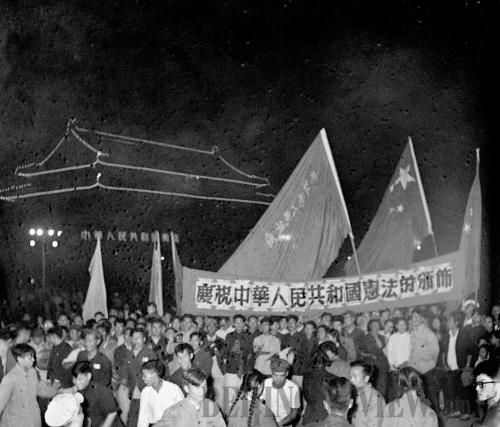|
 |
|
ANNIVERSARY CELEBRATION: Xi Jinping, General Secretary of the CPC Central Committee, delivers a speech at a meeting held in Beijing on December 4 to mark the 30th anniversary of the Constitution's promulgation (HUANG JINGWEN) |
Thirty years ago on December 4, the current Constitution of the People's Republic of China (PRC), the fourth one since the PRC was founded in 1949, was adopted at the Fifth Full Session of the Fifth National People's Congress (NPC), the country's top legislature.
In a meeting marking the 30th anniversary of the Constitution's promulgation, Xi Jinping, General Secretary of the Central Committee of the ruling Communist Party of China (CPC), said, "A country ruled by law should be first ruled by the Constitution, and lawful governance should be based on the Constitution."
Xi said all citizens are equal before the law, human rights should be respected and safeguarded, and people's extensive rights and freedoms should be guaranteed.
"We should endeavor to let the people experience fairness and justice in every judicial case, and should never allow unjust judgment infringing people's rights and interests," Xi said.
A milestone
The Constitution is the fundamental law of the state.
In the initial years of the PRC, the Common Program of the Chinese People's Political Consultative Conference (CPPCC), adopted by the First Plenary Session of the First CPPCC in September 1949, served as a temporary constitution for the country.
 |
|
CONSTITUTIONAL CREATION: The public gather at the Tiananmen Square on September 21, 1954 to celebrate the promulgation of the first Constitution of the People's Republic of China (XINHUA) |
In September 1954, right after the people's congress system was established in China through general elections, the First Plenary Session of the First NPC adopted the PRC's first constitution. It established people's democracy, basic socialist principles, the Party's general political lines in the country's transitional period, as well as the state system and the basic rights and obligations of citizens.
The second constitution of the PRC was enacted in 1975, during the "cultural revolution" (1966-76) that threw the country into chaos. It omitted the principle of "all people are equal before the law," which was enshrined in the 1954 Constitution.
In 1978, the PRC had its third constitution, which, however, soon proved inconsistent with social changes in the country after the implementation of reform and opening-up policy.
The NPC set up a Constitutional Amendment Committee in 1980. In April 1982, a draft of the new Constitution was released for a four-month-long nationwide debate, which eventually involved nearly 80 percent of Chinese citizens and resulted in around 100 changes.
"In the 1982 Constitution, the chapter on the fundamental rights and duties of citizens is put ahead of the chapter on the structure of the state, which marks a significant departure from previous constitutions," said Han Dayuan, President of the Constitutional Law Institute of the China Law Society and Dean of the Law School of Renmin University of China in Beijing.
Han said that the Constitution adds some new stipulations regarding the fundamental rights and duties of citizens that were not included in the 1975 and 1978 constitutions.
"The change in the sequence of chapters suggests that state power is subordinate to citizen's rights, that is, the state cannot infringe upon citizen's rights," said Guo Daohui, a consultant at the Jurisprudence Research Association of the China Law Society.
In addition, the 1982 Constitution terminates the lifelong tenure of top state leaders. "Regular leadership reshuffles ensure overall social stability," Han said.
Subsequent amendments
In the past three decades, the 1982 Constitution has contributed significantly to the development of the country, Han said.
During the period, Chinese society has also undergone dramatic changes. Correspondingly, the text of the 1982 Constitution has been revised in 1988, 1993, 1999 and 2004 to keep up with the rapidly changing times.
| 